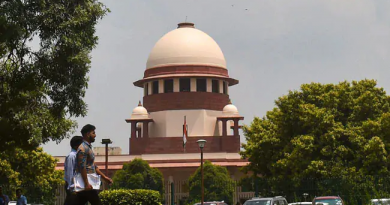High Court of Kerala Judgement on liability…
High Court of Kerala Judgement on liability of incoming partner in the partnership firm Mathew Abraham v/s GIE Plantations Pvt .Ltd. Kochi & Others.
Biju Mathew Abraham v/s GIE Plantations Pvt .Ltd. Kochi & Others
Ex.FA. No. 12 of 2018 (Against The Common Order Dated 22.06.2018 In E.A. No.302 of 2018 & E.A. No.334 of 2018 In E.P. No.219 of 2012 In O.S. No.228 of 2012)
Decided On, 05 July 2018
At, High Court of Kerala
By, THE HONOURABLE MR. JUSTICE K. HARILAL & THE HONOURABLE MRS. JUSTICE ANNIE JOHN
For the Appellant: Nagaraj Narayanan, Saijo Hassan, Benoj C Augustin, V.K. Rafeek, Vishnu Bhuvanendran, U.M. Hassan, P. Parvathy, Surya P Shaji, Advocates. For the Respondents: K.C. Sudheer, Caveator.
Judgment Text : –
1. The appellant herein is the plaintiff in Original Suit No.228 of 2012 as well as the decree holder in Execution Petition No.219 of 2012 on the files of the Sub Court, Ernakulam. The aforesaid Original Suit was filed by the appellant herein against the respondents/defendants herein, seeking a decree for realisation of an amount of Rs. 4,30,00,000/- with 12% interest per annum from the date of suit. The aforesaid claim was settled between the parties and a compromise decree was passed. The above Execution Petition was filed in execution of the compromise decree.
2. The appellant filed Execution Petition No.219 of 2012 against the judgment debtors and proceeded against the attached plaint ‘C’ schedule property to realise the decree amount. While so, several creditors of the partnership firm filed claim petitions in the said Execution Petition. In that circumstances, the appellant filed Execution Application No.302 of 2018 in Execution Petition No.219 of 2012 for attaching the property having an extent of 38.95 Ares, owned and possessed by the 2nd respondent herein, to realise the decree amount. The learned Sub Judge was pleased to grant an order dated 05.06.2018 attaching the above mentioned property of the 2nd respondent. Aggrieved by the said ex parte interim order, the 2nd respondent filed Execution Application No.334 of 2018 for lifting the attachment already granted against his property. The court below heard both Interlocutory Applications together and passed the impugned common order lifting the attachment made earlier and thereby, allowed Execution Application No.334 of 2018 and dismissed Execution Application No.302 of 2018. The legality and correctness of the findings, whereby the court below lifted the order of attachment passed earlier in favour of the appellant have come up for consideration in this appeal.
3. Heard the learned counsel for the appellant and the learned counsel for the respondents.
4. The sum and substance of the arguments advanced by the learned counsel for the appellant is that the court below went wrong by finding that the 2nd respondent is not liable for the liability incurred much before his introduction to the firm. According to the appellant, Annexure-I copy of retirement deed, wherein the respondents have undertaken all the liabilities of the firm, was not considered, while rendering the aforesaid finding. The court below further went wrong by relying on Section 31(2) of the Indian Partnership Act, 1932 (hereinafter referred to as ‘the Act’), when there was a contract contrary to Section 31(2) of the Act. Section 31(2) of the Act would come into play, where there is no contract contrary to Section 31(2). Where there is a contract between the incoming partner and retiring partner to the effect that the incoming partner shall undertake all the assets and liabilities of the existing firm, the incoming partner also would be liable for the liabilities, notwithstanding Section 31(2) of the Act, the learned counsel for the appellant contends. The learned counsel for the appellant cited the decisions reported in Central Bank of India v. Tarseema Compress Wood Manufacturing Company and Others [1997 KHC 1924] and Devaiah B.M. v. Canara Bank, Yeiwai Branch and Others [2003 KHC 3669] to fortify his arguments.
5. Per contra, the learned counsel for the respondents contends that the liabilities between the incoming partner and retiring partner of a firm is strictly governed by Section 31(2) of the Act and the contract between the incoming partner and the retiring partner is of no consequence at all, while considering the claim of the creditors. Further, the learned counsel for the respondents cited the decisions reported in Vinod Babu v. District Collector [2005(4) KLT 412] and Meenakshi Achi & Another v. P.S.M. Subramanian Chettiar & Others [CDJ 1956 MHC 266] to fortify the aforesaid argument. It is further contended that in order to make the incoming partner liable, there must be an agreement; express or implied to that effect between the partners and creditors. In the absence of such an agreement, the incoming partner is not liable to the creditors, notwithstanding the agreement undertaking the existing liability of the firm by the incoming partner.
6. Going by the impugned order, it could be seen that the court below has withdrawn the earlier ex parte order of attachment on the ground that according to Section 31(2) of the Act, ‘a person is introduced as a partner into a firm does not thereby become liable for any acts of the firm done before he became a partner’ and in the instant case, the 2nd respondent was introduced in the firm only on 06.01.2014, whereas the liability incurred much before his introduction into the firm.
7. Here arise the questions, (1) what is the effect and impact of Section 31(2) of the Indian Partnership Act, 1932, on an agreement between the incoming partner and the retiring partner, whereby the incoming partner has undertaken all the liabilities of the firm? (2) Whether the incoming partner is liable for the liabilities incurred much before his introduction to the firm, where there is an agreement between incoming partner and retiring partner, undertaking all liabilities and assets of the firm by the incoming partner?
8. Section 31(2) of the Act reads as follows:
‘subject to the provisions of Section 30, a person is introduced as a partner into a firm does not thereby become liable for any acts of the firm done before he became a partner’.
9. But, in the instant case, clause 2 of Annexure-A1 deed of retirement executed between the appellant and respondents shows that the 2nd respondent has agreed to take over the liabilities of the old firm, notwithstanding the incurring of debt before his introduction to partnership firm and the retirement of other partners. In Devaiah B.M. v. Canara Bank, Yeiwai Branch and Others [2003 KHC 3669], the Supreme Court considered the scope and extent of such an agreement undertaking all the liabilities of the firm by the incoming partner, between the incoming partner and the retiring partner.
10. The proposition that can be culled out from the aforesaid decision is that Section 31(2) of the Act does not forbid or otherwise render impermissible the newly inducted partner taking over the existing liability of the partnership to which he is introduced. What is envisaged under Section 31(2) of the Act is a declaration that a partner, merely because of his introduction into an existing partnership firm, cannot become liable for the acts of the partnership firm done before his induction. It does not go on to make any such take over of liability impermissible, if the partner so introduced wishes to own or share any such liability. The newly introduced partner can claim immunity from the liability incurred before his introduction to the firm, if there is no agreement undertaking such liabilities between the incoming partner and retiring partner or existing partner. The incoming partner must be liable for the debt incurred before his introduction, where there is an agreement contrary to Section 31(2) of the Act, between the incoming partner and retiring partner or existing partner. To sum up, where there is an agreement between incoming partner and retiring partner or existing partner, whereby the incoming partner has undertaken all the liabilities and assets of the firm, despite the incurring of debt or liabilities before his introduction to the partnership firm, the incoming partner would be liable for all the liabilities notwithstanding Section 31(2) of the Indian Partnership Act,1932?
11. Then, the learned counsel for the respondents vehemently contended that unless there is an agreement between the creditor and the partners of the firm, acknowledging the undertaking of liability by the incoming partner, the incoming partner cannot be held liable to for the liability to the creditors. In support of the said argument, the learned counsel drew our attention to the decisions reported in Vinod Babu’s case (supra).
12. The question that arises for consideration is, whether an agreement between incoming partner and the creditor of the partnership firm is required to make the incoming partner liable for the liabilities of the creditor, notwithstanding an agreement, undertaking all the assets and liabilities, between the incoming partner and retiring partner of a firm.
13. We are of the opinion that the answer to this question is also deducible from Devaiah ‘s case (supra). In this case, the Supreme Court held that two conditions must be satisfied before a newly introduced partner can be held liable for the debts outstanding against the partnership before its constitution (i) that the new firm must assume the liability to pay the debt (ii) the creditor must accept the new firm as his debtor in substitution of the old. Therefore, what is required to shoulder the liability on the incoming partner is that there should be an agreement undertaking the liability by the incoming partner and the creditor must accept the incoming partner as debtor in substitution of retiring partner. It follows that where the incoming partner himself has undertaken all the liabilities of the firm, despite the incurring of the debt before his introduction to the firm, by an agreement between the incoming partner and the retiring partner or existing partner and the creditor accepts the incoming partner as his debtor in substitution of the retiring partner, an agreement between incoming partner and the creditor is not required to realise the debt from the assets of the incoming partner.
14. It is needless to say, acceptance is a unilateral act from the part of the creditor alone, and it can be inferred from the acts and deeds of the creditor himself. In the instant case, the appellant accepted the 2nd respondent as his debtor in substitution of the retiring partner by proceeding against the 2nd respondent, for realisation of the debt.
15. It is true that in the decision reported in Vinod Babu’s case (supra), it is observed that in order to render an incoming partner liable to the creditors of the old firm, there must be some agreement, express or tacit to that effect between him and creditors and on sufficient consideration. But, that observation was made in the case, wherein no materials have been placed to show that incoming partner has agreed to honour the liabilities of the old firm, before he became a partner. But, in the case at hand, by Annexure-I agreement the 2nd respondent has undertaken all the liabilities of the firm, despite the incurring of the same before he became a partner. That apart, the decision laid down by the Supreme Court in Devaiah ‘s.



